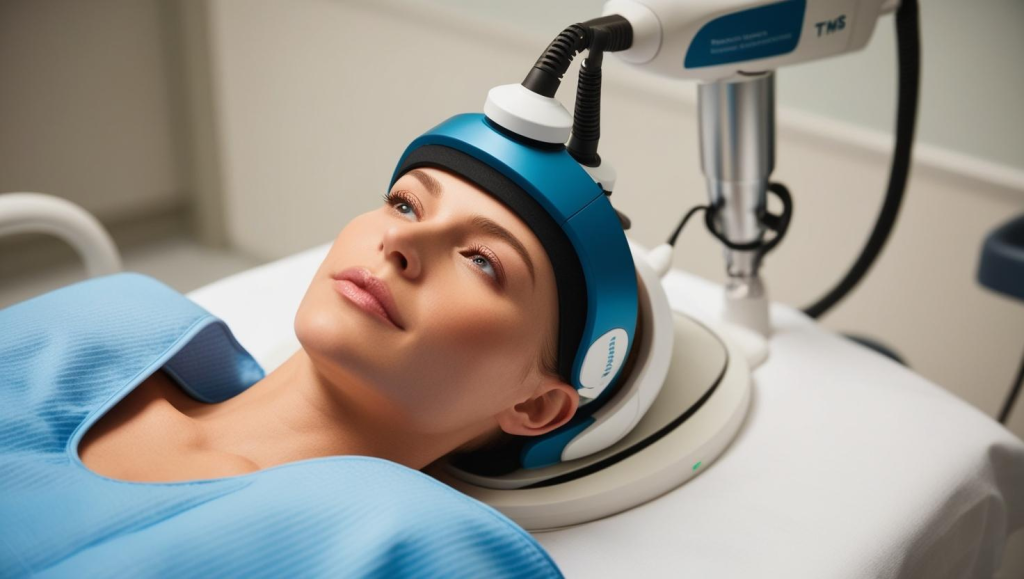In the vast and complex universe of mental health, innovation plays a crucial role, opening new paths and offering hope to those struggling with often invisible challenges. Among the most promising frontiers of applied neuroscience, a fascinating and rapidly evolving technology emerges: Transcranial Magnetic Stimulation (TMS).
Imagine a delicate but powerful approach, capable of modulating brain activity through the use of magnetic fields. These are not invasive interventions or traditional pharmacological therapies, but a modality that acts in a targeted and non-invasive way, opening up new scenarios for the treatment of various conditions and, potentially, for the improvement of our cognitive abilities.
A Journey Toward Change: A Story of Inspiring Transformation
Consider the story of a person who, for years, has lived with the invisible chains of anxiety, obsessive-compulsive disorder, and troubled sleep. Sleepless nights followed days of intrusive thoughts and incessant worries, creating a vicious cycle that seemed unstoppable. Conventional therapies had offered partial relief, but the feeling of being trapped persisted.
Then, the encounter with accelerated TMS represented an unexpected turning point. Through short but intense sessions, almost like a concentrated series of “resets” for the brain, this person began to feel a deep and lasting change in their state. Anxiety subsided, obsessive thoughts lost their grip and, perhaps most surprisingly, sleep became restorative again, a much-needed oasis of peace. Within months, the diagnostic criteria for the conditions that had long clouded his existence were no longer met. This is not a fairy tale, but a reflection of the transformative potential that TMS can offer.
How Does This Revolutionary Technology Work?
TMS is based on a fundamental physical principle: electricity and magnetism are interconnected forces. A device generates short magnetic pulses that, when applied to the scalp, penetrate the brain. These impulses induce weak electrical currents in specific brain areas, modulating neuronal activity.
Many mental health conditions are hypothesized to be associated with disordered neural activation sequences. TMS could act as a gentle “tuner,” helping restore healthier, more balanced activity patterns. Instead of focusing solely on chemical imbalances, attention shifts to the “choreography” of brain activity, trying to harmonize the “rhythm” of neurons.
The Power of Speed: The Accelerated Approach
Traditionally, TMS treatments involve numerous sessions spread over several weeks or months. However, recent developments have brought accelerated protocols, such as the so-called “SAINT protocol”, to the fore. This approach condenses a large number of sessions into a much shorter period, often over the course of a few days.
Imagine being able to complete an intensive course of treatment in just one week, rather than months. This acceleration not only makes therapy more accessible in terms of time, but also appears to enhance the effectiveness of treatment for some individuals.
What to Expect During a Session?
During a TMS session, the person is comfortably sitting or lying down. A specialized operator places a magnetic coil on his head, in correspondence with the target brain area. The delivery of magnetic pulses produces a sensation similar to light tapping or “flicks” on the scalp. This is not a painful experience, although some may experience slight initial discomfort which tends to subside quickly.
After the session, it is common to feel a little tired mentally, as after an intense intellectual effort. This sensation, although significant, is generally temporary and disappears with rest.
A Call for Prudence: The Importance of Professionalism
Excitement about the potential of TMS should not obscure the importance of a responsible and informed approach. Attempting to self-administer TMS at home is categorically not recommended and potentially dangerous. Incorrect application of magnetic pulses can cause physical injury and even worsen pre-existing conditions.
It is essential to turn to clinics and professionals with solid clinical experience, who work in collaboration with consolidated hospital structures and who follow protocols based on scientific evidence. As in every area of health, relying on qualified personnel is the guarantee of safe and effective treatment.
Beyond Cure: Potential Horizons for Improvement
The applications of TMS could extend well beyond the treatment of mental health conditions. It is hypothesized that, in the future, this technology could be used to enhance cognitive and even sporting performance. The possibility of influencing the ability to concentrate, reaction speed or other specific abilities opens up fascinating scenarios in the field of human improvement.
Accessibility and Hope for the Future
At present, accelerated TMS is not yet widely covered by healthcare systems and can represent a significant economic investment. However, it is expected that as research progresses and awareness of its potential grows, the availability and accessibility of this technology will increase in the coming years.
Although the effects of accelerated TMS can be long-lasting, for many people periodic booster treatments may be needed to maintain the benefits over time. These “updates” are generally less intensive than the initial cycles and represent a strategy to consolidate the well-being achieved.
A Promising Alternative for Many
A particularly encouraging aspect of accelerated TMS is its potential as an alternative for individuals who are not suitable candidates for other therapies, such as those assisted by psychedelics. Specific conditions or a particular family history may represent contraindications for some therapeutic approaches, but not necessarily for TMS. This opens up new treatment possibilities for a wider range of people.
In Conclusion: A Beacon of Hope on the Path to Wellbeing
Transcranial Magnetic Stimulation represents an exciting frontier in mental health care and, potentially, in improving our abilities. Its non-invasive nature, combined with the promise of profound and long-lasting changes, makes it a beacon of hope for those seeking new paths to wellness.
While research is still ongoing and a prudent and informed approach is key, the experience of those who have benefited from this technology is inspiring and fuels confidence in its transformative potential. TMS is not a magic wand, but a powerful tool that, in the hands of expert professionals, can open new horizons in our journey towards a more peaceful and fulfilling life. The future of mental well-being is enriched with a new, promising possibility.









